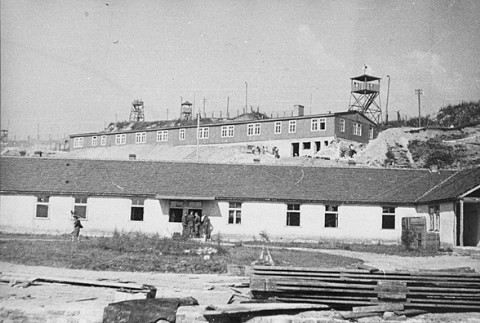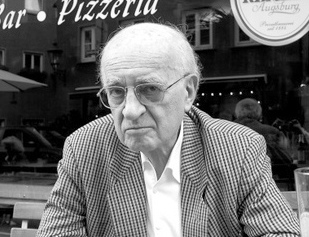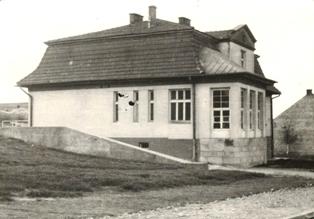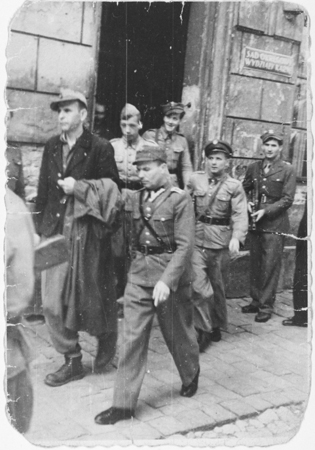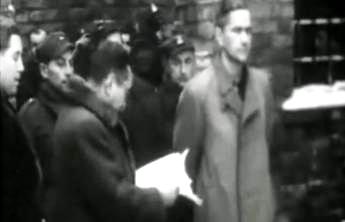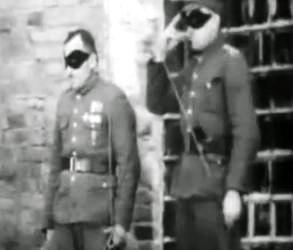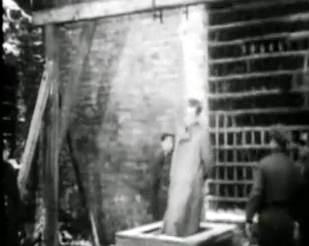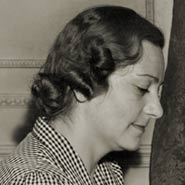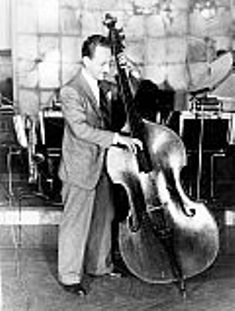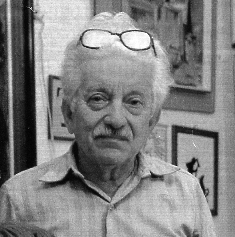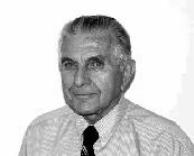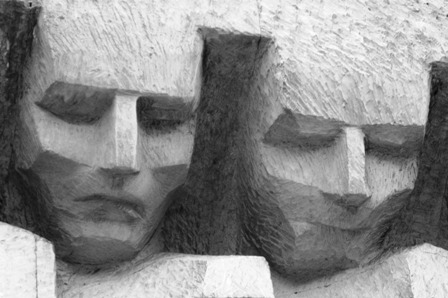Holocaust Education & Archive Research Team |
|
Trials Introduction to the Holocaust Trials
Trials
Interrogations & Testimonies
The IMT Series Nazi Justice
| |||||||||||||||
The Trial of Amon Goeth Part 3
Selected Extracts from the Testimony
28th of September 1946
The Chairman summons all witnesses who are identified, he then instructs them as to their obligation to tell the truth, they are then taken out of the court hall, with the exception of witness Mr. Pemper who remains to give evidence.
Judge Zembaty: Is the witness able to establish the number of victims in the camp of Plaszow?
Witness Pemper: This would not be easy for me, as I have worked in the camp command office. I do not know that the mortality rate from natural causes was very low, even unexplainably low. As far as mortality due to non natural causes, there were approximately 500 persons killed due to repressive measures connected with escapes.
Judge Zembaty: In total, what does the witness estimate the number to be?
Witness Pemper: I am certain, that excluding the transport of 14th of May, the number exceeded 5-6,000. The victims resulting from the liquidation of the Krakow Ghetto, I estimate at 2,000 in the camp alone.
Including all the victims, also those connected with the action from the Ghetto of Tarnow, adding various selections, group incidents, and singles, I am certain the figure is well in excess of 5,000 persons.
Judge Zembaty: Whenever a prisoner was killed, for example, savaged by dogs, or shot, in what manner would this be recorded in the camp records, what reasons for such details were entered in the camp files?
Witness: Pemper: These records were only introduced in the period when the camp was functioning as a concentration camp, before that only files existed, 4 types of files. In those files, a death was noted with the word “Abgang” (departure) without any further clarification, as opposed to “Zugang” (arrival), the personal card would then be removed from the file, and placed in a separate file.
Judge Zembaty: No note was made that death was due to shooting?
Witness: Pemper: No. There were daily “appell” record sheets, which assisted in the keeping of the prisoners numerical control, and these sheets/lists, prepared daily, showed clearly all changes. Let us say, yesterday’s level was 9,500, today’s 9,550, the list or “appell” sheet, would be changed to 60 arrivals and 10 died of various causes.
Judge Zembaty: The witness mentioned that prisoners were killed by shooting, hanging, savaging by dogs. Were there in addition other methods of killing being used?
Witness: Pemper: The incidents of savaging by dogs, were in general rare. Hanging on the other hand, was a permissible way of killing in a concentration camp. In a forced labour camp it was applied when the death was intended to be used as a deterrent to others, as in the case of Hauberstock and Krautwirt.
I recollect the hanging of two prisoners for attempted escape. Various SS dignitaries from Krakow were invited, one of whom even read out a statement or announcement, to the effect, that they are being hung in order to deter others from attempting similar acts.
Judge Zembaty: Did other methods of killing exist, in addition to those mentioned so far?
Witness: Pemper: There were cases, where a prisoner could not take the beatings, following the application of 100 hits or more, was unfit for work, he would then be beaten further, and then finished. This happened in the action at the beginning of August.
Judge Zembaty: In what manner would such a prisoner be finished?
Witness: Pemper: By shooting.
Judge Zembaty: With regard to the matter of torture, the witness mentioned yesterday, that hanging by the arms was practised, you have mentioned the incident involving a person called Frenkel. How long did this take?
Witness: Pemper: Several hours
Judge Zembaty: Has the accused been present throughout that time?
Witness: Pemper: When I entered the office, they were waiting for me, as I had to be the interpreter during the interrogation, it took three hours.
Judge Zembaty: Without interruption?
Witness: Pemper: The stool was manipulated by hand, enabling the prisoner to regain consciousness, and induce him to provide information, every half an hour the stool was produced for this purpose.
Judge Zembaty: Did any one faint?
Witness: Pemper: Yes, they had water poured over them, terrible beatings took place. The accused conducted and controlled the interrogation. By the time I saw Frenkel I did not recognise him.
Judge Zembaty: What were the conditions in the camp in the winter, were the barracks the prisoners were sleeping in heated?
Witness: Pemper: In this respect there existed considerable limitations, but this became irrelevant as the overcrowding of the prisoners was so great, that the prisoners kept themselves warm, by their own heat.
Judge Zembaty: What about the nourishment of prisoners?
Witness: Pemper: The nourishment was very poor
Judge Zembaty: Did a possibility exist of food reaching the camp from outside of the camp?
Witness: Pemper: The answer is no, and that applies throughout the time. There were attempts, and at a later stage partially some success has been achieved, in the form of additional bread allocation. There existed also a very important channel of help, in the form of medicines from Jewish sources – specific medicines from the Ghetto until its destruction.
Chairman: Would you please summon witness Henryk Mandel
Witness - Henryk Mandel:
In the first half of January 1943 I have been selected and sent from the Ghetto in Krakow into the camp in Plaszow. In the camp at that time, were approximately 2,000 persons, the commander was Muller.
Beginning of February, the accused arrived in Plaszow, the camp at time was comparatively small, a rumour spread that the new commander is from Vienna and that the conditions in the camp will improve. Within two days we were made aware what conditions we can expect.
The accused assembled all foremen, works directors and made a speech, he declared that he is taking over command of the camp in Plaszow and demands from all strict obedience in the execution of orders, and as evidence that he is not joking, all were ordered to be flogged with a certain number of strokes. Several days later, public hanging of two women was organised.
Chairman: Has the witness seen this?
Witness Henryk Mandel: Certainly, this took place beginning of March 1943, and with this, we have learned what treatment we can expect from this Viennese new commander.
Chairman: What was the reason for the hanging of these two women?
Witness Henryk Mandel: They went into the Ghetto without permission, the accused learned this, had them brought to him from the Ghetto, and hung immediately.
Chairman: In that case they were hanged on orders of the accused?
Witness Henryk Mandel: The accused was there, and gave the order to hang them. On the 13th of March more Jews were brought from the Ghetto in Krakow into the camp and I will describe the methods that were used to conduct a search of them.
The accused was inside the barrack which housed the doctors, I overheard as he spoke to his men, “In this barrack we must conduct a very strict search, as here are Jewish doctors, who were very rich, and most probably they have brought this wealth with them from the Ghetto.”
Watches and various and other small items were being surrendered then, with the accused looking on. A few days later the “painting” took place, that is where we were painted with yellow and red stripes. Red stripes, those working in the camp, yellow stripes all those working outside of the camp. Whilst this painting was taking place a general “Appell” was called, we were prepared for something new.
And we were not disappointed; the accused walked with other SS officers along the lines and picked out various prisoners. After this he ordered tables to be brought out, and there and then flogging was ordered, across the bare buttocks, on the selected persons, men, women, with varying numbers of strokes. Goeth then announced to all, that he is not joking, we must all work as he orders, and that the work performed so far, was inadequate.
Chairman: In that case, this was a form of penalty?
Witness Henryk Mandel: No, this was an example to all prisoners, so that they should be aware, that he who does not work, will receive a beating.
Chairman: Did he assist in this himself?
Witness Henryk Mandel: He did assist himself, the accused walked with a group of his men, and pointed out those who in his opinion needed more beating.
Chairman: How many strokes were given?
Witness Henryk Mandel: Between 25-50, the group for flogging consisted of several hundred persons. Several tables were used, and several persons did the beating.
Chairman: What was used for this beating?
Witness Henryk Mandel: Riding whips
Chairman: Were these beatings counted, was the prisoner required to keep the count or were these people beaten without an accurate count and did the witness see this?
Witness Henryk Mandel: I have seen all of this, as it was an “Appell”
Chairman: When was this?
Witness : In March or possibly beginning of April, going into town to work, these prisoners worked from 7am to 6pm. One day, upon returning in the evening, we were assembled again for work, and made to work until 12 at night, and from that day on, the afternoon shift continued until 12 at night.
We were told that the road must be finished with the utmost speed. One day I have been given permission for a day off work. I did not want to stay in the barrack, so I hid in a barrack of a friend and there, through a window I heard a shout and saw as the accused shot a young boy who was laying stones in the road construction. After shooting him, he moved the body about with his boot, to satisfy himself that he was dead.
Prosecutor Siewierski: For what reason was this boy shot by the accused?
Witness: This I cannot say, all I have seen is that the boy was bending, as if in a working position.
Chairman: The witness has seen this?
Witness: That is so.
Chairman: From what distance?
Witness: 25 meters
Prosecutor Siewierski: Was the boy working at the time?
Witness: This I do not know. At another time one or two persons escaped from the camp.
Chairman: When was this?
Witness: At the same time, more or less. The whole camp was assembled on “Appell” and then the accused selected 8 young boys from this group.
Chairman: Selected or summoned?
Witness: The accused indicated who is to be selected, they were marched off, shot and the hole the bodies fell into was later covered with earth. Next was the matter of the so-called “Transport column.”
I have been moved to that transport column, it consisted of approximately 100 persons. One day 30 persons from that group went to work on the railway goods station in Plaszow, returning into the camp, we had on us some purchased bread and other items of food, which we carried with us almost every day for relatives and friends. The camp rations at that time consisted of a loaf of bread (1.4kg) and two spoonfuls of some rotting jam per week per person. The jam had an inscription “nur fur haftlinge” (Only for prisoners).
The jam consisted of a mixture of various fruits and beetroot, squashed together, and decaying. Not wanting to die of starvation, groups going into town, had to bring whatever they could back with them for their families.
When we returned at 12 for lunch break, we were stopped by the guard commander at the gate, who enquired what we are carrying and wanted to see if we are not carrying arms or ammunition. He carried out a superficial search and found that we had bread, sausages and butter on us.
At that he shouted, “you want to stuff yourselves with bread and sausages, and our soldiers at the front are dying of hunger.”
This happened not far from the house of the accused, when he lived in the so-called “Red Cottage.” He then run for the accused, and we were ordered to wait on the small parade ground.
We were aware, if the accused comes and sees what we have with us, we will all be shot, so we attempted to bury some of these items in the ground. But it was impossible to bury the whole lot.
The accused came, and ordered everything we had with us, to be placed on a table, which happened to be there. When everything was placed on the table, he then asked where did we obtain the money from, as the possession of money in the camp was forbidden.
Not one of us replied, he then declared, that if we will not reply, he will have us all shot, and to convince us that this is not a joke, he took a rifle off one of the Ukrainians and shot one person happening to be near him, from a distance of two to three steps. This person from our group shot at that moment, had most of his head shot away, all that remained was part of his chin.
He then enquired if we will talk now?
In between he beat us with his rifle butt and also its barrel in a most terrible way, I had several teeth knocked out then. When no one responded, once again he shot another person nearest to him.
Chairman: Was this a Mr Deisler?
Witness: Yes or maybe Nachhauser, as I do not remember
Chairman: How old was Nachhauser?
Witness: Approximately 19, he was a student in the 7th class. Diesler was about 45 years old. When he was shot for the second time, that prisoners head also seemed to explode. I was standing right behind, and was struck by parts of the skull in my face, and a slight deflecting bullet injury to my forehead.
I fainted, when I revived at first I thought I was dying. I heard the accused continuing with the beating, and repeating that all will be shot, that not one from this group will survive alive. I tried to lay still, thinking that when the burial party for burying us, comes, I will somehow get myself out of this danger.
After a short while two Ukrainians came along, who started to search if any one buried any money. They noticed I moved and said that I need “finishing off,” I opened my eyes, in order to see and assess the situation, and saw that the Ukrainians were called away by the accused, in order to divide among themselves the food found on us.
And happy at the outcome, these Ukrainian guards went away. I exploited this moment and re-joined the group of my friends, who with saliva assisted me to wash my face, so as to conceal the fact that I am injured. After a short while the accused returned, he counted our group and confirmed the numbers as in order, saying 28 alive, 2 killed.
He then called Chillowicz and told him to bring the best whips, which he has in the guard’s office, and two tables, he then instructed, that each one of us is to be given 100 strokes.
The two tables were brought buckets of water as well, and the execution of his order commenced. We had to count ourselves, loud, having been forewarned not to make a mistake, as should anyone miss-count the beating will start from the beginning.
And so everyone did his best to count precisely, and when the hundred strokes has been reached, as a finale you would receive a few more, across the head, if you did not clear off the table promptly.
Immediately after me a Mr Meitlis was beaten, he was an elderly man, weak, who screamed terribly. When he reached the number of 30 strokes, the accused ordered to start afresh, in order to quieten him down, and simultaneously beating him on the head without a count, and then once again from the beginning.
Meitlis screamed even louder, at that, the accused picked up a brick, and hit him with it, on the back of his skull, causing the brick to shatter into small pieces and ordered another 100 strokes for him.
At the end of each beating, everyone had to report to Goeth, stating what he received, the accused would ask, “are you satisfied, and do you know why you were whipped?”
Meitlis when he came off the table, did the same, reporting to Goeth and when he turned, the accused took his revolver out, and fired, into the back of the mans head, at close range.
He then issued an order, forbidding any one to treat our wounds in any way. There were among us several injured, among others a Mr Rosenstrauch, who was injured by a shot in his cheek, with the bullet coming out through his neck, and others, somewhat less seriously hurt.
As a result of the beatings, the flesh on everyone was completely torn, and of course we were all bleeding and to ensure that we received no treatment or assistance two Ukrainians were ordered to guard us.
After this, an order came, for all of us to be taken to work. The barracks for the guards were under construction at the time, we were issued with wheel-barrows and shovels, and at a running pace, were forced to work at these barracks. The guards however, pitied us, they brought another group of 30 men from somewhere, some were placed to watch that no German approaches, and we were ordered to crouch in a ditch, where we hid, and only thanks to this, we survived this fatal day, without any further tragedy.
Witness - Mrs. Regina Nelken
Witness: During May 1943, the so-called “Health Selection” took place, we were all called onto the “Appellplatz.” There we had to parade naked, in front of this inspection committee, headed by the chief SS camp doctor, Dr Blanke.
Chairman: How long did this take?
Witness: Several hours, as it involved the whole camp
Chairman: You were all paraded naked, men and women?
Witness: On one side, were men, and on the other side, separated, women. We were all undressed. People passed in front of these inspectors undressed, and as soon as it was noticed that someone is not well built, has any deformities, is injured or weakened by hunger, all those were asked to step aside, their names were noted. A week later that was on the 14th of May 1944, we were called again onto the Appellplatz, and then all those selected and noted, the previous week, were taken out and separated from us.
They were then taken on some wagons away. I do not know when they were sent away, as I did not see this. They also liquidated on this day, the children’s section of the camp. As we were all assembled on this “Appellplatz” it enabled the SS to carry this out with ease.
The children were loaded onto lorries, and at one point we could clearly see these lorries, loaded with children, along the road. The children were waiving to their mothers, saying goodbye.
A terrible panic developed among us, women screaming, and at that moment, through the loudspeaker system they played nursery lullaby tunes, such as “Gute Nacht Mutti” (Goodnight Mummy). The mothers were even more incensed by this, and there was a danger that the situation may go out of control. At this point, the accused run about, with a revolver in his hand, shouting, that should any one step out of line, they will be shot.
Chairman: What else was played at that time?
Witness: Nad kolyska matka czuwa, in German (a Polish nursery rhyme, translated meaning, “Over the childs cot, mother stands guard.”) Soon after this the luck of the accused deserted him he was disciplined by the SS.
He worked in the camp administration office, one night late, the accused requested that someone from the office, comes over, to type something for him on a typewriter. As the accused worked at night very often, no one was surprised at this request. Goldstein reported for this job, a clerk from Krakow, who went to the home of the accused. He was there the whole night, in the morning passing through the “Appellplatz”, we saw him again, with a bullet hole through his head.
Chairman: Did Goeth shoot him personally?
Witness: No, but it was done on his orders. The accused seeing that his position becomes delicate, decided to have all possibly incriminating witnesses removed.
One day on a Sunday, he called the Jewish camp police commander Chilowicz and his wife, they were shot, after this the whole family of Chilowicz was called, and also shot. They were Faerber, Schoenfeld and his wife, a young girl by the name of Gutt and a camp policeman Finkelstein. They were laid out on the camp road, and we were all ordered to parade past the remains of these people.
Chairman: What did you know about these parties?
Witness: Following the second selection conducted by John, as Goeth was busy organising a party at that time, in his residence, I have seen as a whole convoy of guests, with their female escorts, arriving through the SS road, the orchestra playing at the guards barracks, when on the other side of the barbed wire, a selection was underway, conducted with terror and merciless beatings on the “Appellplatz”.
The people knew what all this was leading to, they tried to hide, they tried to defend themselves, they tried to run, the Ukrainians were constantly chasing and harassing them, to the execution hill, as if they were cattle for slaughter. Whilst at that same time, a large happy party was taking place in the villa.
Chairman: How many people were taken at such a selection?
Witness: That I do not know exactly
Chairman: 20 -30?
Witness: Of course not, 60-70 minimum
Chairman: For what reasons did these selections take place?
Witness: If John did not like you.
Chairman: What type of character was this John?
Witness: A person who was laughed at by all the SS men
Chairman: Why were they laughing at him?
Witness: Because he had a comical shape, small, fat and liked to talk a lot.
Chairman: Did he treat the prisoners unfairly?
Witness: I have had no contact with him
Prosecutor Cyprian: How was it with Gutter?
Witness: He was the president of the Judenrat (Jewish Council) in the Ghetto. One day he was called, Goeth ordered him to be shot, with his wife and three children.
The Court summonses the witness Miss Rosa Grunberg, aged 19, office clerk
Witness -Miss Rosa Grunberg
Chairman: Has the witness observed any acts of torture, beating of prisoners, in the camp of Plaszow by the accused?
Witness: Of course, I have been in Plaszow from the 13th March 1943, to the end, that is the 14th January 1945, Goeth all the time tortured my father. He was a structural engineer in the camp, he performed the function of a “Bauleiter” (Works Director) and as such, directed the various building works.
Chairman: Did Goeth by his treatment of your father, attempt to belittle him in front of you?
Witness: I do not know what were his intentions. My father begged him, he should shoot him, but Goeth did not want to do this, as he needed my father. It was reported once to the accused, that the workers are not working correctly, Goeth had my father called to him, and asked him, if he is satisfied with his workers, my father replied, “Yes,” whereupon Goeth replied, “You are defending your workers again you will receive a beating for them.” Goeth attacked and beat up my father at that time terribly, and asked for my mother and myself to be detained.
We did not know what for, we were held a whole night, and then ordered to be released. These acts were being repeated all the time, we were living in constant fear. We were living through hell, not once but dozens of times. Once on the occasion of a hanging of someone, the accused turned to my father and said, “Grunberg! next Saturday I will hang you, together, with your wife and daughter.” We did not go to the “Appell,” we went into hiding, waiting for them to come and fetch us, but they did not come.
There was an accident when one of the guard barracks collapsed, Goeth shot the engineer concerned Mrs. Reiter.
Chairman: Have you seen this?
Witness: No I have not seen.
Chairman: Where from do you know about this?
Witness: From my father, in any event, this was common knowledge in the camp.
Chairman: What have you seen yourself?
Witness: Not a lot my father tried to shield me.
Chairman: Have you witnessed how Goeth beat your father?
Witness: I did not see it, I did see the results, when he received 100 strokes with the whip.
Chairman: Who told you about the beating?
Witness: My father, in any case, I could see what condition he found himself
Chaiman: You have not witnessed Goeth beating your father at any time?
Witness: After the beating, my father stood up, and reported to Goeth that he is not fit to go to work. He had water poured over him, and Goeth said to him, “Grunberg, do not attempt to pretend you are ill, you have to be at work.”
Only one of his eyes was visible, he was bruised all over his back, legs, arms. Goeth beat him personally, the whipping was done by Gross and Hujar. Once at 9am an order came, for my father to report at a camp building site, to supervise the works. My father wanted to report for this work, as he wanted to protect us. I begged my father that we should take poison.
Chairman: What with?
Witness: I had cyanide, I brought it in from outside of the camp, my father refused
Chairman: Why?
Witness: I do not know, what kept him alive. He wanted to get up, and go to work, but he could not move. The next day, he managed to raise himself and go to work. He was at work from 6am to 11 at night, he held on, with unbelievable strength.
After two days, Goeth came to the site office, and shot, at that time the foreman of the special work groups, sent to assist. My father was beaten again by him, and he issued an ultimatum, that this guard barrack, must be finished within three days.
This was an impossibility. My mother was detained together with me, in the camp police cells, to be hanged. We were there the whole week, certain that we will be hanged.
Chairman: Did Goeth search for you where you lived?
Witness: He did come once, looking for me, my father was at work, my mother who was there, was beaten up. It was then a piece of his whip fell away. I have kept this piece, as a souvenir. After a week we were released. This happened due to the intervention of Mrs. Chilowicz. His villa has just been finished, he was in a good mood, and he agreed to have us released, when begged to do so by Mrs. Chilowicz.
Prosecutor Siewierski: What punishment was your father subjected to, when a barrack burned down?
Witness: That was a hospital, he was given 25 lashes.
Prosecutor: Do you know this from your father as well?
Witness: Yes
Prosecutor: When were you, together with your parents, sent out of the camp?
Witness: On the 14th of January, as the Russians were approaching.
Prosecutor: Were you in the camp to the end?
Witness: Yes.
Into the Court room enters Maurice Perlman, aged 21, student.
Witness -Maurice Perlman
Chairman: What knowledge does the witness have from the times you have spent in the camp?
Witness: I have been in the camp in Plaszow from the 13th of March, on the 14th of March our group assembled on the “Appellplatz”. Through the whole length of the “Appellplatz” we were passing bricks from the old Jewish cemetery, up to the carpentry workshops.
I have been standing next to a very large grave, very often a wagon loaded with people arrived, some were already dead, but most were still alive. Ukrainians stood nearby, they were men of the unit of Janec, and with a series of automatic shots, these people were being finished there.
Next during an “Appell”, I do not remember the exact date, Goeth being on the Appellplatz, around 7am, approached a Mr. Spillman, and started beating him. He asked him if there is something he does not like – following this he pulled out his revolver and shot him. The next person that day was Sonnenschein.
Chairman: Has the witness seen this?
Witness: Yes I stood at a distance of 20 meters from Sonnenschein, who was also first beaten up, and then killed. He then beat a Mr. Blecher, all on the same morning.
A little later, I do not remember the date, during the night shift, we were working in the paper workshops, I went out to the toilet, and have noticed the accused standing with John, under a window of the next barrack, which housed the brush factory. The accused took out his revolver, and fired through the window. I have later learned that a Mr Keller has been shot dead.
Chairman: For what reason?
Witness: I do not remember the details. He was the Kapo (foreman) in the brush factory. He came once with John to the brush factory, he called all to assemble, and made a count. It emerged that two persons were missing.
The Kapo was unable to explain what happened to them. Next, Goeth, made a spot check in our paper section, the count was in order. He went out – after a few moments we heard two shots. It emerged that Goeth shot a Mr Finkelstein and someone else as well, who were returning from the lavatory.
Chairman: For what reason?
Witness: Most probably, because they did not ask for permission before going to the lavatory
Prosecutor Siewierski: Were they the two missing, when the adjoining barrack was unexpectedly checked?
Witness: Yes those were the two
Prosecutor: Where did the witness work?
Witness: In the paper workshop, and later in the printing workshop
Prosecutor: What was being done in the printing works?
Witness: For SD – secret printing (SD was the German Sonderdienst)* a section of the Gestapo. We were printing leaflets, the text of which, called the population to join and fight with the Germans and Russia, signed on behalf of a “Democratic Block.”
We were also printing another one, but I only assisted in the finishing. The second leaflet was supervised by a German, I had no access to it. I do not remember exactly, but they were some war communiqués. Then a request arrived, for the first time, for three of our printers, who were transferred to the camp head office.
A week later two SD officers arrived, bringing with them a completed layout, demanded an immediate specimen print, when completed, they left taking with them the proof and the layout. Those same officers returned later, and those items proofed, were printed on our presses. 4 -5 persons were employed on this job, we were threatened with death, if the contents of the printing were disclosed.
Chairman: Did the witness print as well?
Witness: Yes only one side
Chairman: What was it?
Witness: A call to Poles calling them to fight with Germany and Russia, this was signed Democratic Bloc, or Bi party Bloc, I do not remember now.
Chairman: When was this?
Witness: This was at the time the camp was a forced labour camp, if I am not mistaken this was in October 1943, the exact day I cannot quote.
Chairman: What was the printing run?
Witness: 1- 2,000 I do not remember exactly
Chairman: What format was used?
Witness: Normal office letter size
Chairman: Was this printed on coloured paper?
Witness: No, on white paper, printed on both sides
Chairman: Does the witness remember, how did this begin, what was the title?
Witness: I cannot remember the title, I believed it started “TO OUR POLISH BRETHEREN” but I do not remember exactly. The next incident; one morning two Germans arrived, bringing with them a Polish type-setter. He remained for a certain time with us, but was specially guarded.
He was type- setting in a small room, which was used to be a type correction room. In the evening one of those Germans loaded the completed print, packed in a parcel into his car, and the second German led the Polish type-setter up onto the hill.
Chairman: What happened to him?
Witness: I do not know, most probably he was shot, as that is what was said in the camp, that someone has been taken up there that evening. A little later, they again came with a Polish printer, who worked a whole day.
Approximately 3 – 4 days later, he arrived on his own, this time with a revolver on his side, and a little later he showed up in a Gestapo uniform. We were printing only small runs, when completed the type- set had to be dispersed.
Chairman: In every case?
Witness: Yes the type would be dispersed, but they were soaked with printing ink, and also stuck together, so that some items could be restructured. We were able to reform certain words such as “Fatherland,” “Freedom.” We were also printing the large placards, announcing death sentences of Poles. These large sheets, seen everywhere in the streets.
Chairman: Does the witness know anything about the transport to Auschwitz?
Witness: By us in the paper works, worked a Mr Steif. He was selected on the 14th of May for the transport to Auschwitz. One day he returned to the camp. In the first few days, he did not want to say why he returned, but later we did learn from him why he returned.
We learned from him, that following the selection, he told Goeth, that he has his whole family valuables buried in Niepolomice (a small town near Krakow). A little later he went to Niepolomice, whether he found there something or not, I do not know, I only know that he was shot at the same time as Chilowicz, up on the hill.
Prosecutor Cyprian: How many people worked in that paper workshop and how many on that press?
Witness: 150 – 200 worked there, including 50 – 60 young girls
Prosecutor: Did the accused go there often?
Witness: Yes often, the SS men themselves used to come ahead, warning us that Goeth will be coming, that everything should be in order.
Prosecutor: Did he beat any one amongst you?
Witness: Yes, very hard, once the master printer, when he arrived, 6am in his car, the same day when he shot Goldstein. He came and ordered large sheets of lined paper. We did not have such paper there. Whereupon Goeth said that if he will not receive this paper, within five minutes, he will shoot the master printer. He may have been drunk, I could not say.
Prosecutor: Following the shooting of Chilowicz were you also made to parade in front of the remains of them?
Witness: Yes, the remains were laid out on a spot next to the entrance into the women’s camp. The whole camp had to parade, in a complete circle, onto the other side of the camp. Opposite of these remains, stood German Kapo’s and SS men, and those of us who did not want to look in that direction were beaten with whips.
Prosecutor: Above those remains there was a board, what was its text?
Witness: That they were shot for possession of arms.
Next Witness: David Grunwald, age 36 Office clerk
Witness: -David Grunwald
Chairman: What is known to the witness about the accused, from the times of your presence in the camp in Plaszow. Were you personally maltreated in any way, and what murders were you a witness to?
Witness: From the first period, and from my own misfortune, I will mention my little daughter, who ended up in the camp, with her sister, on the 15th March, from the Jozefinska Street in the ghetto, from where a transport of prisoners held by the O.D.(Jewish Police), the accused brought himself over.
One of my daughters died from a bullet, I have been told this by her sister. My second child, luckily, survived thanks to the fact that a dead body of a person shot, fell on top of her. She then slipped from the spot she fell, and managed to hide behind a large tombstone. When she raised her head, she looked around, looking if the SS men were still in the vicinity, on the cemetery where the shooting took place. After that, she managed to run away from there, whilst there she passed out at some stage.
I myself have been working as a prisoner, in a flour mill, near Krakow, then as a secretary in the Polish camp, from 13th September 1943 until October 1944, when I have been sent out to the camp in Gross Rosen.
Already in the first months of my stay in the camp, I have been very interested with the circumstances we were finding ourselves there. At the beginning the commander was Hauptscharfuhrer Muller. At that time, the prisoners in Plaszow, enjoyed a comparatively comfortable existence. From the moment the accused took over command, the conditions in the camp changed radically.
Immediately, we received news of public executions, there was talk of disappearing girls, never to be seen again, escapees caught were also disappearing if caught, torture and other incidents of suppression were happening all the time.
The first traumatic event in Plaszow, was the surrounding of the camp by the Ukrainians, and the confiscation of all our possessions. Goeth roamed the barracks himself, threatening everyone with death, for all valuables to be surrendered.
From that period I remember the shooting of the block leader, of a adjoining block, where in one of the sleeping bunks, some silver coins were found belonging to one of the prisoners.
On our way to work, in town, until September 1944 or on our way back, we would hear the latest turmoil in the camp, such and such state for Goeth, 5-0, or 6-0. It was common to hear of executions for bringing in food into the camp. In this way I have lost a friend, in a group of 5-6 persons, at another time, a whole group was lost, returning from work in Bonarka.
Chairman: What was the reason for the loss of these people?
Witness: If I would manage to obtain the information, it was for bringing into the camp food produce. It was explained that this food produce belonged to the kitchens, or SS stores, and were obtained by the prisoners illegally.
Chairman: How did this end?
Witness: As soon as he came to Plaszow, Goeth ordered a group of people to be taken to that hill top, and there they were shot. A similar incident, the shooting of a large group of people from Grzegorzek, this group was brought by Untersturmfuhrer John, and lost there on the orders of Goeth.
As from September, I took over the position of secretary in the camp where the Polish prisoners were held. My function, and that of my fellow employees there, was the taking from newly admitted prisoners all their personal details, keeping their records, maintaining a list and durations of sentences, dates of release, which took place every Monday, and also a preparation of documents for eventual interrogations.
The prisoners were brought into the camp for various types of crime, some administrative, disobeying the curfews, travelling on public transport in compartments reserved for Germans only, declining to work. Political prisoners were brought in as well, some just under suspicion, belonging to revolutionary parties etc.
Later when the camp became a KL, people from other prisons or camps were being brought in as well. Normally, administrative offences, were punished with a sentence of one month detention.
Chairman: Who was giving these sentences?
Witness: The arriving prisoner always had a document called “Evidence of Delivery of a Prisoner” sent with him, this document showed the offence and the determined duration or type of sentence, very often without detailing the sentence, which was determined at a later date by the SS- Polizeifuhrer.
The pre-determined one month sentences for administrative offences were used only at the beginning. When the Polish camp lacked the requisite number of prisoners, the SS wished to have there, the duration of detentions would be prolonged.
These extensions of sentences worked as follows, by simply not knowing the background or offence of the prisoner, the alleged accusation would be thought out, or simply the following sentence would be entered on the form “The prisoner has not yet learned the rules required in prison.” The sentences were increased by two months on the first occasion. These proposed additions to sentences were always signed by the accused Goeth. If he did not approve the text of any such proposed application, which had to be submitted to the SS Polizeifuhrer, the accused would ask for changes to be made, and re-typed.
At the beginning the prisoner level in the camp was quite low, especially in the group detained for breaching curfew regulations, and as a result penalties were being increased to 6 months for singing any Polish melody. From this group some prisoners have died.
Chairman: For what reason?
Witness: From mistreatment. At the beginning, during the establishing period of the camp, no parcels were allowed to be received by the prisoners. This changed when Berlin has taken some interest in the prisoners. At that time, that camp was under the direction of Landsdorfer, who was promoted to the rank of SS- Scharfuhrer, a man of limited intelligence, who emulated Goeth in every way.
To him Goeth was a God figure, in all his actions he tried to impress his commander, namely Goeth. On the 13th of March they carried out a selection among the prisoners, which enabled them certain rights, as applied in the camp at the time to Jewish prisoners, they were marked “R” (Rustung Service), “W” (Wehrmacht) and “Z” (Zivil), this enabled the recipients to return into the camp. My father in law selected did not receive the required marking, in view of his age, was sent to the so-called Ghetto “B” where the next day, or maybe on the same day he was shot.
Chairman: I believe the witness is in possession of certain details regarding the liquidation of the Ghetto in Krakow?
Witness: On the afternoon of the 13th March, I observed the accused Goeth walking with his riding whip. When he noticed somewhere a larger group of people, he would disperse them, using the whip with merciless blows.
Chairman: Has the witness seen this?
Witness: Yes with my own eyes
Chairman: And referring to the orphanage, what about the children, what can you tell us about this?
Witness: In the Ghetto I did not know anything about this, as on the two days in question, following the liquidation of the orphanage, which took place on the 14th of March, I have been hiding in a house, together with two children of my own, and three friends of theirs.
Chairman: What about the camp personnel, do you remember with whom Goeth would surround himself with, did the witness have any contact with him?
Witness: Following the establishment of the KZ, the accused tried to deliver into the camp prisoners who had some previous experience in camp life. And then, in two or three groups, prisoners from various camps arrived, Poles, later Germans and those Kapo’s enjoyed special privileges on direct orders of Goeth.
They had a special block, even with a radio and received additional food rations. These prisoner Kapo’s moved and behaved in the camp, in a terrible way, they reported to the SS on other prisoners, food smuggled into the camp with considerable difficulty, they would confiscate.
Practically in every instance of food confiscation by them, this food would be divided among the German Kapo’s alone. There were deranged characters among them, who tried to have young boys included in their groups to satisfy their sexual whims.
The Jewish prisoners working in the relief work groups, learned of this, or they were alerted to this, and every attempt was made to make this impossible for them. In addition these Kapo’s on their initiative, during a certain period, organised searches among fellow prisoners, and the loot would be divided and shared with Goeth.
Chairman: What about Bloch, what does the witness remember about this?
Witness: This matter I know of only having heard about it?
Chairman: Would you explain?
Witness: I have heard, that the accused, being drunk, on a walk, which he frequently did, crept quietly around a barrack, where men were working on a night shift . He looked into the interior, and spotted someone asleep, or not performing his designated function at the time. He called the OD man Bloch out, ordered him to remove his policeman’s cap, and shot him.
Chairman: What does the witness know about the “Merry House?”
Witness: The accused ordered the selection from among the female prisoners, of several Polish girls, who were accommodated separately, in a special barrack, where only SS men had access to, and also the Ukrainians, to satisfy their sexual needs.
Chairman: Was the witness present when a mass execution has taken place?
Witness: I have been present once, being by accident in the central stores, I observed from a window, how this was being carried out. Well, following the arrival of the prisoners in a police car or van on that spot, the prisoners were forced to jump into the prepared ditch or hole from the vehicles, and whilst jumping or running in that ditch, what was to be their grave, they were shot, or whilst already lying wounded, SS men walked along the ditch, shooting at anyone still moving.
Chairman: What about the burning?
Witness: They laid out one layer, then wood was placed onto it, then another layer of remains of prisoners, wood again and so on, all was then soaked with petrol and so they burned these people.
Chairman: Does the witness remember still any further details?
Witness: I can mention about my work in the so-called “Effectenkammer.” This was an establishment within the camp, where all documents, valuables, of Polish prisoners on determined detention were kept.
We stored these items in special bags, and when the prisoner was due for release, it was returned to him. The valuables and money taken from Jews was also stored there, but these were not documented, and no records were kept.
These items, already no doubt depleted by Germans, who collected this during or following the executions, they were very eager to take part in these actions because of this, but the Commander, nevertheless introduced a special reward to all who assisted and took part in these actions.
The articles taken from the people lost came to the “Effectenkammer” sometimes stained with blood. We were instructed to record totals only, so and so many diamonds, rings, amounts of money, foreign currency, dental gold, gold dentures etc.
Chairman: What methods were used to retrieve this dental gold?
Witness: In every case, following an execution, a dentist would arrive, and removed gold teeth from the people killed. Irrespective of this, we had deliveries of dentures from those remains, being transferred from other burial grounds, and later those exhumed, destined for burning.
Next Witness: Henryk Bloch age 46, Businessman
Witness -Henryk Bloch
I will start my evidence from a time point a few days before the liquidation of the Ghetto, which is connected to the meeting I had a few days later with the accused.
In the Ghetto I had a workshop producing glass products. Two days before the liquidation of the Ghetto, on the 11th March, the accused appeared for the first time in my workshop in the Ghetto. On the Saturday the Ghetto was liquidated, I have been transferred into the camp.
The Sunday passed, and on the Monday, all directors of so-called “gemeimschafts” (small workshops) were summoned by the accused, in order together with him, to inspect the barracks, and find suitable accommodation to install the varying types of equipment within the camp.
I have been in this group passing through the various barracks, we entered one, where painters were working. The Kapo in charge was not there, and no one reported to the accused on his entry into the barrack. This was on the second day of my entry into the camp.
The accused asked for the Kapo man, and why no one came to attention on his entry? A Mr Faerber approached the accused, and began to report, the accused was not satisfied with this effort. He then asked Faerber, who was painting tin buckets red, how many such buckets can be painted in one hour?
Faerber could not answer this question. The accused took out his revolver, fired and laid him dead on the spot.
Chairman: The witness has seen this?
Witness: I stood right there. Also there was the “Lageraltester” Chilowicz who was ordered to have the remainder of that group, flogged with 25 lashes. The barrack selection was then interrupted.
Two days later, following the arrival of all selected for the camp from the Ghetto, groups of people were being sent out to various work assignments in town, in fact to clean up the Ghetto in Krakow.
The priority was given to those, who had to close the workshops in the Ghetto, such as tailors, brushmakers, shoemakers and glaziers. I have been among these, in a group of 10, in order to close my workshop.
One day, returning from work in the Ghetto, we were stopped from proceeding out, near the baths in Jozefinska Street, as a very heavily escorted group of people, was being marched out ahead of us, who were caught hiding during the various actions, and managed to survive so far.
There were many incidents, where people, especially with children, would hide, as it was forbidden to bring children into the camp. And it was on that day, that such a transport of people was being marched out, our group followed a few minutes later. As we reached the camp, and approached the hill towards our accommodation barracks, we saw, or rather we heard, as these people were being executed.
A few days later, being in the Ghetto in connection with the transfer of my workshop to the camp, I was arrested whilst working, and taken to the Ghetto police station of the O.D. There I have been interrogated by Kunde, from 10am to 5pm, and beaten terribly in the process. Finally, I have been tied up with springs, and so taken into the camp.
In the camp I have spent 15 days in detention as a result. Whilst there, I was together with Mr Olmer, who was torn apart by dogs. We were approximately 70 persons in that detention cell, men, women and children, all together.
One Saturday, in the morning, we were all chased out of that cell, into a yard, as the cell was supposed to be cleaned. Being in the yard, and in front of the cell, we noticed the dog of the accused, this was a sign that the camp commander was approaching, as the dogs never wandered alone in the camp.
The dogs emerged from underneath of the barrack that contained our detention cell. Goeth himself approached from the direction of the “appellplatz,” immediately we were ordered to attention in groups, and interrogation of all, by the accused began.
In the course of this interrogation, everyone was beaten by him, massacred, in a most brutal and sadistic manner. He was accusing people of possession of Christian documents, American documents, intentions of escape and so on. Among us, as I have stated was Mr Olmer.
Chairman: The witness has used the word “massacred.”
Witness: Yes the accused beat people in such a manner that each blow resulted in a cut of flesh. He was beating with a whip, and his fist, and each blow resulted in a cut. He was striking at the heads and faces of people.
Chairman: How many of you were there?
Witness: Approximately 70 persons, he started the interrogation with Mr Olmer, demanding that he divulges where from he obtained documents giving him the nationality of Peru. He pleaded innocence, claiming he had no knowledge of any Peruvian documents.
After beating Mr Olmer, he was left there. The rest of the group was then ordered back into the cell, whilst I have been left outside of the cell, at that moment, the accused told Mr Olmer “Run,” and has he started to do this, the dogs went after him, one of the dogs caught him by the back.
Chairman: On orders of the accused?
Witness: Yes. The dogs began to tear at him. Ripping the flesh Mr Olmer was screaming with pain. It was a question of a few steps, he fell, the accused then approached him, and fired into his head.
Following this I worked with the so called transport commando, one day I went out in a group of 30 persons, out of the camp to load a delivery of coal, bricks and timber, which arrived for the camp. We returned at 12 into the camp, for lunch, as we were working very near to the camp.
As we were entering the camp main gate, several Germans were standing there, among them the accused. One German approached us, ordered us to stop, and said “What do we have?” I had a briefcase, others had a small rucksack, and others had some food on them in their pockets, or under their coats.
It was a beautiful hot day, June or July. The Germans found some bread and other bits of food. He ordered us to wait as he had to report this to his chief. He duly reported to his chief, and Goeth came towards us.
A thorough search of all began, we were ordered to place everything we had in front of us. We did this, in the meantime we threw away what we could, so that as little as possible should be there for him to see. The Ukrainian camp guards surrounded us, the accused ordered whips to be brought there from his home, and the beating commenced, carried out by Goeth himself, using whips with long leather strands, also a heavier type of whip, like a rhino whip.
Goeth was unarmed, wearing a silk shirt and a sort of blouse over his shoulder, he did not have his military belt on either. He promised that he will have the whole group of 30 shot, if we do not disclose where the money for these food items came from, where were they bought and what methods were used to make contact with the population outside of the camp?
Beating at random, he took a rifle from Kunde, reloaded, without taking aim, started shooting at us, from a distance of 1-2 steps from him. He ordered us into 3 rows of ten, and started shooting. I have been standing in the first row of ten. The first shot went through my hand, the bullet then struck and penetrated the head of the man standing next to me, and then into the neck of a third man.
He repeated this, and fired the second time, aiming somewhat better, killing this time outright one of the 30. He then beat us with the butt of the rifle, as he run out of ammunition for that weapon. He then threw the rifle aside and ordered his deputy to start beating us.
Goeth himself then went away to have his lunch, we were then taken to the back, next to the house he lived in. Two tables were brought, also buckets of water, and they started beating us directly on naked flesh.
Chairman: Did he order this, and how many times?
Witness: Yes 100 times each. But everyone received more than 200, and even 300. Every prisoner had to count every strike loudly, if a mistake was made in the count by him, the beating started afresh from number one. We were not beaten by one person, they were taking turns as one man would tire very quickly, having to hit someone 100 times with full strength.
The whip would be passed to another SS man there, it was impossible being hit so many times, to count properly, people were making mistakes and the beatings were starting afresh. And so the beatings went on and on, the tables were covered in blood as every hit, meant a fresh cut in someone’s flesh. As anyone went off the table, he was virtually one bloody mass of cut flesh. Everyone getting off the table was ordered to report, standing to attention, “I report humbly that I have received my sentence.”
In many cases, we were even asked, if we knew why we received this sentence? After this we all went to the side, human remains, but not people. Having finished his lunch, Goeth stood by, watching the whole proceedings.
In the course of all this, one man screamed terribly. The accused shouted at him to calm down, to count. The man did not calm down, Goeth approached him, picked up half a brick off the ground, went to the table on which the man was being beaten and from a very close distance struck him on the head with that brick, splitting his head.
The beating of that man continued uninterrupted, then pouring of water and beating again. Covered in blood, with a split head, he went off the table approaching the accused he reported that he received his penalty. He was ordered to go away, and as the man turned, Goeth pulled out his revolver (after lunch he came back with his belt and revolver) firing into the back of the man’s head.
In the meantime the beating of the remainder continued without interruption, when all were beaten, which took from 12- 3pm we were all taken to the OD police station, and there, Goeth ordered doctors from the camp hospital to come to us. He did not allow anyone to be taken to the hospital, only on the spot medical attention was allowed.
The doctors did come, but could very little, as all the wounds were sheer cuts requiring stitches or bandages, neither of which were possible or available. He then ordered a unit of Ukrainians to arrange us. We were to go to do hard work, without bread or water until 8pm.
And so it happened, we were taken to the barrack buildings for the guards, everyone was given a wheelbarrow and had to cart these fully laden with sand until 8pm. Practically all of us, from this group, as a result of this event, died in Plaszow, the wounds would not heal, the flesh was continually infected, it was rotting on us whilst we still alive.
After this I have been assigned to a works group called “SS- Bonarka.” I would leave the camp daily with this group of 50 persons to and from work, this lasted for some time, the experience that I went through, however, never allowed me to forget what danger lurked, by returning into the camp with a piece of bread in your pocket.
Witness -Jan Mischel (age 34, clerk)
On the 20th of January 1943 I have been interned in the labour camp of Plaszow. Mid-February the accused took command of the camp. Only two weeks after he became the camp commander, at the end of February, the first execution has taken place.
A man working for the Ostbahn (German Railways in the East) in Plaszow, entered a shop to buy a loaf of bread, was caught at this by a guard. On returning into the camp from work, the guard reported this incident to the accused. Goeth ordered the assembly of all the prisoners, and in full view of all, the man was hanged.
During the hanging, the rope snapped, the prisoner begged Goeth for mercy, who ordered the hanging to be repeated. During this execution, a supervising engineer, a Mr Ringel had a heart attack.
On the 14th of March 1943, the liquidation of the Krakow Ghetto “B” commenced. In the early hours of the morning, which was a Sunday, a rumour spread in the camp to the effect that Goeth in company of his friend Unkelbach, left for the Ghetto, both armed with automatic weapons.
Two hours later, we learned that they are assembling a group of people, who were to go to the cemetery, in order to dig a new large ditch. I volunteered to join this group, it consisted of 150 persons. We dug a ditch 50 or 60 meters long and several metres deep.
Not long after this task was completed, horse drawn wagons began to arrive, loaded with corpses of people shot in Ghetto “B, “ the first several hundred that arrived were still dressed, thereafter the wagons brought bodies that were already undressed.
A section of our group was made to throw the corpses from the wagons onto the ground, another section would pass them into the grave ditch. In the grave the bodies were laid out side by side, and when one layer was complete, it was covered by a light layer of earth, and followed by a next layer of corpses.
In the cemetery whilst this was in progress, several Ukrainian guards were present, also a few SS men. Next to one SS man there was a box, and a few of our people were used to bring any valuables found either on the bodies, or in their clothing, and deposit these items in that box. It was in this manner, that we were made to perform this gruesome task, on that cemetery for approximately 6 hours.
Chairman: Who was that person Unkelbach?
Witness: A friend of the accused, he roamed around in the camp, and according to what I have heard from a friend, Leon Jekiel, who miraculously survived this action in the Ghetto “B,” Unkelbach, Hujar and Goeth behaved with exceptional brutality towards the victims in the Ghetto, shooting en-masse. It has been overheard, Unkelbach saying, that he will shoot all the doctors, nurses and patients of the hospital.
Chairman: Did Goeth participate in the shooting?
Witness: My friend stated that he did shoot
Chairman: What function did you perform in the camp
Witness: I worked on the “Ostbahn” and when that section was no longer required I worked with the groups erecting the camps barracks.
Chairman: I understand the witness recollects the incident with Goldstein?
Witness: Yes one day, about 5.30 in the morning, Goeth arrived in his car, stopping outside our barrack, where secretaries working in the camp administration offices were quartered, and he took Goldstein with him to his house.
At 7am and now on the parade ground, awaiting allocation to our work stations, I noticed Goldstein walking back from the direction of Goeth’s house, accompanied by an SS man called Gruen. Gruen and Goldstein walked comparatively slowly, Gruen smiling to him, and walking in the direction of the tailor’s barracks.
At one point, Gruen stopped suddenly for a moment enabling Goldstein to advance a few more steps forward. With lightening speed Gruen drew his revolver, simultaneously firing into the back of Goldstein’s head. As Goldstein fell to the ground, Gruen fired yet another shot to finish him off.
From the fact that they walked together, slowly, casually, even smiling to one another, from the lightening manner of drawing his revolver and shooting, I came to the conclusion that Gruen was ordered to shoot him before he could meet any of the prisoners, and divulge what went on in the home of Goeth in those few hours.
Chairman: And what about those people from the cable factory?
Witness: One day 16 persons were brought into the camp from the cable factory, they were accused of some alleged sabotage. I witnessed their execution. These people were shot near the camp baths. They were ordered to undress, and one of the guards shot the whole group, then the naked remains were taken in wheelbarrows to a spot underneath the baths, and that was where they were buried.
Chairman: What about Beim?
Witness: I have witnessed the hanging of Beim, who was a Kapo, at that time the people employed at the factory N.K.F. were quartered there, and Beim was their Kapo. He had been accused of accepting bribes, in order to have people quartered there instead of the camp itself. And it was for that reason that he was hung. I have been present during that execution. The hanging took place in the presence of Goeth.
Chairman: At what other executions were you present?
Witness: I have also been present at the execution of Mr Haubenstock and Mr Krautwirth.
Chairman: Would you describe that incident?
Witness: Commander of the camp, Goeth ordered a general “Appell,” gallows were prepared on the parade ground. He ordered Haubenstock and Krautwirth to be brought there. Haubenstock was the first to be hung, the rope snapped.
Haubenstock begged Goeth for mercy, to save his life, Goeth nevertheless ordered the hanging to be repeated. In the meantime Krautwirth, whilst this was in progress, cut his wrists. Unconscious from loss of blood, he was taken to the gallows and hung. A few minutes after this, Goeth made some sign towards an SS man called Gross, and fired twice, once each into the heads of the hanging men.
Chairman: And what about Schonfeld?
Witness: I have been present when he was shot by Goeth, in November 1943, this took place during the preparation of the transport for Skarzysko. Goeth walked through the barracks housing the metal workshops. in one of these workshops, during the selection of experienced and non-skilled men, one person was shot by him. A few minutes later he entered another of these barracks and selected Schonfeld for the transport, Schonfeld approached him begging him to leave him in the camp.
Chairman: Why?
Witness: He explained his wife was in the camp, and he would like to stay here, and that he was not skilled. Goeth told him to move himself. Schonfeld approached him for the second time, it was then that Goeth drew his revolver and shot him. Both of these men, I had to carry up the hill, where they were buried in a mass grave.
Chairman: Have you witnessed any incidents of beating carried out by Goeth?
Witness: I have witnessed Goeth beating his horseman, Stefan Pemper. Pemper was sent into Krakow with a carriage to collect some Germans. New horses were harnessed to the carriage for these horses, which have not as yet been trained for town work.
In the town centre the horses panicked, and broke the shaft pole. Returning into the camp, Goeth called him onto a large enclosure situated behind the stables. We were able to observe this from the steps of the camp baths. Goeth walked over to Pemper and said something to him, Pemper attempted to explain, Goeth immediately started to shower him with hits of his whip across Pemper’s head. After this initial beating, Pemper was ordered to undress completely.
After undressing, Goeth called the man in charge of the stables called Antor, and ordered him to beat Pemper with a whip. This continued for a long time, thereafter he took the whip he was using away from Antor, and gave him his own whip in order to continue. Antor beat Pemper with all his might, and when he eased off due to exhaustion, Goeth took the whip back from him and continued himself.
Chairman: And what about Bloch, would you explain how did this happen?
Witness: Goeth very frequently inspected the camp workshops at night. Usually during these inspections he was drunk. One day he walked into the tailoring workshops, and ordered a count of all present. The count did not tally with the numbers of people that should have been there, two persons were missing.
Bloch was unable to explain the discrepancy, nor could he explain where these two men were at the time, Goeth ordered Bloch to receive 100 strokes of the whip. A few days later Goeth once again went to this workshop, where Bloch was on duty, but before entering he looked through the windows and noticed one person asleep and several others not working.
Goeth at that time was accompanied by a Ukrainian, his driver called Ivan, Goeth entered the workshop, Bloch was unable to explain why these people were not working, Goeth then ordered Ivan to shoot him.
Ivan marched Bloch out of the barrack, Bloch managed to make an attempt to run, but at close range and with three shots, Ivan had no difficulty to shoot him
Witness -Helena Horowitz (age 30, seamstress)
Witness: I arrived in the camp on the 13th of February I managed to obtain work in the camp kitchen, where I worked as a potato peeler. Right at the beginning I received 10 strokes on my back for allegedly not working hard enough. A short while after, I have been selected by the kitchen Kapo to work in the kitchen for the Germans.
I enjoyed the work there, and I have been promised that if I continue to work as at present, I will be retained there permanently. At that moment I was there in place of a maid who was taken ill with Typhus, at a later stage I have been retained to work there permanently.
At the beginning I believed this to be tremendously lucky, but at that time I have not been aware of the terrible behaviour of the accused. My first encounter with him, was as follows;
After a dinner I threw out the bones remaining on a plate, in the evening the accused appears in the kitchen and demands to know where are the bones, I replied I threw them out. He struck me in the face, with such a force, that I fell over and he tells me that if I will not obey his orders, he will shoot me. Once in the “Red House” entering a room I noticed a rifle, or another type of weapon
Chairman: You must clarify what was this “Red House?”
Witness: This was the private residence of the accused. That is where I noticed how he held a rifle, and congratulating himself on its ability, or his expertise, in front of other Germans also present in the room, he was firing at a group of people working at a distance of maybe 200 metres from the apartment window.
Next another fact, following the liquidation of the Ghetto in Krakow, Jews were brought into the camp and on to the hill only to be shot there. After the execution a party took place there, at which I have been subjected to abuse and torment.
There were women in the party as well, and despite the fact that they were of low morals, frequently they came to my defence. He would tell them that I am Jewish criminal who must be treated without pity.
Another fact in the “Red House” he drunk round the clock, still drunk he would come to me asking if I have prepared a dinner party, which he intended to give in honour of a president called Brauling, I believe that was his name. I replied clearly to this, that I am not aware of this at all, as I have not received any instructions to this effect. At that point he grabbed me with both his hands by my throat, choking me, as a result of which I fell unconscious to the ground.
After regaining my consciousness I asked why he did this? He replied first of all because you ask questions, and secondly because you did not carry out my order, which in reality, he never gave, because he was drinking that day round the clock.
He then told me at the time that if the dinner party will not be a success, in the evening, I will be shot. Naturally, following such a threat, I did what I could, so that the dinner party was prepared in a exemplary way. All the food used to prepare this dinner came from the camp prisoner’s kitchen.
Luckily for me the party turned out to be a success, and to my surprise, the following day he was furious again. I did not know that an additional person would turn up for the party, Goeth summoned me to him, asking why was the table laid short for one person? Without waiting for my reply, he threw a sharp knife at me, which penetrated my leg.
Another fact, in the camp there was one German called Biegel who worked in the camp commercial buying and selling administration office. At one dinner party this officer Biegel gave an order to a boy, who worked there as well, he should fetch a carriage from the stables. The boy froze when told by Biegel, he will be whipped 25 times, if he fails to carry out his order.
Naturally, the boy brought the carriage, as ordered, which Goeth learned later. Goeth summoned the boy to him and asked him who gave him the order to bring that carriage there. The boy replied, explaining the circumstances and how it arose. Goeth without listening to the boy, killed him on the spot, the boy was 20 years old.
Chairman: Have you seen this?
Witness: Yes I have been present, when it happened.
Once I have been summoned to his room in the morning, where he showed me his uniform thrown against a wall. He asked me why I have neglected and failed to clean it?
I was unable to explain this, Goeth, assuming that I was neglectful, hit me across my face, that made me more nervous, it must have shown itself on my face, as he dragged me into another room, and there beat me without a stop, damaging my ear drum. Only following the interference of his mistress, that the beating stopped.
Chairman: What was her name?
Witness: Ruth Kalber
Chairman: Not Majola?
Witness: That was how she was called in the camp
Witness -Josef Reiner (age 25, a student)
Witness: I have been sent into the camp on the 13th of March 1943, during the month of October 1943 I have been assigned to work transporting wooden boards. We worked on a railway siding situated in Wielicka Street.
Despite of the fact I had a bad leg, I have been forced into this transportation work of the boards into the camp. After doing this for several days, I did not have any more strength to continue, and decided to do whatever possible to be transferred from that job.
Luckily and by coincidence, it was a hot day, the chief of the Jewish Police Chilowicz came along, and ordered everyone to take their coats and jackets off, it was then that I showed him my bad leg and he ordered me to guard these jackets and coats of the men working there.
Around 11am another man from that group came to me and asked to be allowed to help me in that same function. I told him this was not possible and if he is unable to work I cannot become responsible for this. He remained with me, we stood there until 2pm, the boards were being stacked at a spot overlooked by the windows from the office of the accused.
The accused often appeared at the window observing what went on deep in the camp. And it was then at 2pm that he caught us two sitting. We were called to his office, as we walked, he considered that we did not walk fast enough, and were ordered to walk faster.
We were asked what we were doing there? I explained to him, on hearing me, he said that, “He alone has the right to rule there, the chief of the Jewish Police has no right whatsoever to give orders.” He then asked the man with me, what he was doing there?
The man tried to explain, then seeing he was in serious trouble, as Goeth by that time drew his revolver, he attempted to plead, that he had a mother in the camp, that he should be spared. At that point, the accused called the man by his name, Fleiss, and ordered him to turn around. The man did not want to do this, he tried to run, the accused fired and the man fell dead.
He then came to me, I turned around, the accused positioned me exactly, as he wanted, and fired at me. I fell. I do not know how long I lay there unconscious, when I regained consciousness I found myself lying in a pool of blood.
Chairman: Were you hit by that shot?
Witness: In the head, the accused always fired at the head. At that moment I refrained from moving, as there was the possibility of the accused observing me and coming over to finish me off. I waited until someone came over. Presently a Jewish Policeman, whose name was Liebling came over, with two men who came to bury us.
They did not notice that I was still alive. A few moments later I moved my head, and when the Policeman established that I was indeed alive, he took me, with the assistance of one of the men, by a roundabout way back into the camp, at a considerable risk to himself.
I lay for three days in the camp hospital, after that I managed to return to my barrack. By the middle of November, they started transporting people out of Plaszow, into other camps. Destinations were unknown and no one knew whether these transports were going for work, or whether they were destined to their deaths.
I had a doctor’s certificate, but decided to work in the workshops, as remaining in the barracks, in light of the strict checks was very dangerous. Just at that time the accused, assisted by various other SS men, decided to carry out a selection for one of such transports, at the metal workshops where I worked. The selection seemed to be on the principle of retaining skilled men there, and dispensing with all those who were unskilled or superfluous.
Next to me stood a man called Schoenfeld, the accused ordered all skilled men to go to the side of him, and everyone tried to go there. Schoenfeld in his anxiety, tried to run across, the accused at that moment thought that too many have already crossed there, fired his revolver at him. It seemed, as if a signal, to all to stop crossing over. Schoenfeld fell in agony, screaming. The accused bent over him, he then kicked him in the face, followed by another shot, fired at close range.
Witness -Berenhaupt
Witness: I have been in Plaszow as from the 13th of March 1943 until 15th of October 1944. During the time of the liquidation of the Ghetto, on instruction by Striebitz, I had to return into the Ghetto to collect clothing for which purpose 3 horse drawn wagons were allocated.
That same day after the departure of transports, I could not find anyone in the Ghetto, but 8 bodies lay in an area of approximately 200 meters in Wegierska Street.
On the second day, on a Sunday, we had the first “Appell” in the afternoon. Because of an incorrect number of people in the group employed at “Madritsch” I have been beaten with a whip several times across my face.
On the Monday I have been assigned to bury bodies brought into the camp, on horse drawn flat carriages, from the Ghetto in Krakow. On the 27/28th of March a general search was carried out in the barracks. At 9pm all barracks were closed and surrounded by Ukrainians.
At 4.30am the accused appeared in our barrack, accompanied by the Ukrainian guard called Janec, and also others, demanding that all gold, silver, fountain pens, valuables and postage stamps to be handed over. At that moment Janec walked over to the accused, reporting to him that he found 5 silver coins in the oven.
The accused asked whose coins were they, and who placed them there?
The accused assured us that whoever did this, will not come to greater harm than to receive 50 lashes across his bare back. As no one came forward, he ordered the man in charge of the block, Mr Solewiczow, to remove his trousers, seeing marks of a previous beating, he marched him outside.
The man begged him, saying that he has a family, what was a mistake, as the accused did not like any begging or questions, he then shot the man. He then returned into the barracks, approached me and asked, “Don’t you like it?”
He marched me out, stood me against the wall, I do not know why, maybe because I did not beg him for mercy, or maybe because I worked for Madritsch but he let me go. Warning that he will return and if such thing is repeated he will shoot me and ten others as well.
Witness -Berek Fega (age 52, tailor)
On the 13th of March 1943 I have been in the Tarnow ghetto whilst the liquidation was in progress.
I have seen when at approximately 5pm the accused was approached by a little boy begging him several times to be allowed into the camp. He said to him, “Sir, chief, please I want to live, please allow me to enter the camp.”
Goeth grabbed him by the arm, hit him against a wall so hard that the brain started to stream out, and then shot him. I have seen, soon after this, two children standing in a doorway, in Krakusa Street. He went over to them and killed them.
I followed him, as I wanted to ask him about my children, as I would have liked him to let them go. Later in the day I have been sent to work in Tarnow, as I worked in the firm of Madritsch. In September 1943 I have been present during the liquidation of the Ghetto in Tarnow.
On Thursday morning we were all standing on the Appellplatz there, called Magdeburg platz. I saw one woman attempting to cross that square, the accused told his driver to put “her down,” the driver duly obeyed and shot her.
On Friday we were the last group there in the Ghetto, and I have seen Goeth shooting at least 50 men, women and children. The children were being shot because their mothers were hiding them in rucksacks, as it was announced that taking children with you was forbidden. Goeth controlled the whole action. There in Tarnow, it was like the war front, cannons, machine guns, it was hell on earth there.
Chairman: What about the loading?
Witness: I have seen how he was selecting.
Chairman: At the railway station you have not seen him?
Witness: No, as I have been in the Ghetto
Prosecutor Cyprian; You have stated, seeing children hidden in rucksacks?
Witness: I myself have been hiding them in rucksacks
Prosecutor Cyprian; Were you there present, when these children were being taken out and murdered?
Witness: I could not have been there, as I have been in the ghetto at the time, what I am saying is that I have seen these mothers with the children being driven.
Prosecutor; Were these children in the rucksacks?
Witness: No, they were no longer in the rucksacks, but in lorries. Several of my friends spoke of seeing Goeth walking and announcing that children are to be surrendered.
Chairman: He was walking on his own?
Witness: This is what my friends have told me. But I have seen with my own eyes, as the vehicles arrived, as the accused came, chased them all into the Szpitalna Street and shot them there himself.
Accused: I did not understand, were these persons shot in the Ghetto, or on the railway station.
Witness: In the Ghetto
Accused: When was this? the liquidation of the Ghetto took two days
Witness: This was on a Friday, it all started on Thursday, the exact dates I do not know, it was on day two.
Accused: Does the witness know that immediately after the transport was loaded for Plaszow, I left Tarnow that same day.
Witness: That is not true
Accused: You can call as witnesses the Jewish Council of Tarnow, the transport reached Plaszow the same day, Thursday and was off-loaded by me personally.
Witness: That Thursday we were standing the whole night in the so-called Magdeburg Square we departed on Friday. The accused is making a mistake
Accused: This does not correspond with the state of facts, that same day the transport did reach Krakow, and was off-loaded.
Witness: Not true, I remember exactly that on Thursday we had a morning shift, and a friend comes and tells me “watch out,” the Ghetto is already surrounded.” The selections went on the whole day. The whole day, the accused personally conducted this, as for his assistants, they were all drunk.
Accused: No one could be drunk, the people did not have any time for this.
Witness: There was one, I do not remember his name, I do know he walked about in civilian clothes, and was drunk to an extent that he was falling over. Goeth walked about with his arms folded, and continuously selected people.
Accused: That is impossible, as all the people were lined up, according to professions, so selected by their own Jews.
Prosecutor Cyprian: The Accused stated yesterday, that he himself has not murdered any child. Here the witness testified that the accused fired at the children, who were taken off the wagons, and he himself arrived there.
Accused: I confirm that same day I left Tarnow, and am able to produce witnesses, who will confirm this.
Prosecutor Cyprian: Yesterday the accused, towards the end of his testimony declared, that he did not shoot at any people, or children, which were offloaded from the wagons. I will present evidence of a witness, who is here, at the disposal of the court.
Mr Leon Leser, at present in Krakow, who will testify to the contrary, that the accused murdered the majority of the people, among them children, and that the accused wiped the perspiration off his forehead, after this. He then ordered a bowl of water, and washed his hands. I request for the examination of this witness by the court.
Witness -Leon Leser (age 39, a mechanic)
Witness: This happened during the liquidation of the Ghetto in Tarnow, in September, I do not have the exact date in 1943.
Very early in the morning the whole Ghetto was surrounded, that was at 3am in the morning. I walked out onto the Magdeburg Square. The people were assembling, as they sensed that something was brewing.
At 7am Goeth arrived in the Ghetto, people in the square surrounded him, even approached him, asking him what will happen here. He told them, “You will all be transferred to the camp in Plaszow.” He announced that everything is to be taken valuables, clothes, as it will all become useful in the camp. He roamed all over the Ghetto, he ordered us all to assemble according to their places of employment.
There was Ghetto “A” for those working and a Ghetto “B” for those that were unemployed. He ordered everyone employed from the Ghetto “A” to go to the Ghetto “B” and assemble there according to places of employment. There were groups working for the Ostbahn and Madritsch among others, where children worked.
Every group had a board, indicating the name of the employer where they worked. When everyone had been assembled, he selected a group of 300 persons, as a Sauberung (cleansing) column. I was lucky I managed to be included in that Sauberung column, approximately 200 men and 100 women remained in that column.
We assembled once again separately, at that point a fiancée of one of the Jewish men, approached Goeth, her name was Batista, begging him, to allow her to stay with her fiancée, who is remaining. He refused, she begged him once again, he ordered her to turn around, and fired into her head. She fell dead.
After that, he segregated all the people again, he took out those that should go to Plaszow. All so selected left the Ghetto, the others also selected by him remained on the Magdeburg Square. Goeth drove over to oversee the loading of the wagons at the station, returning later to the ghetto, he ordered that we are to be locked in a barrack, situated on the Magdeburg Square.
When he returned again, I noticed some young boy approached him, he said something to his ear. Immediately after, Goeth went to his car, and drove away. Half an hour later, a covered lorry arrived, followed by Goeth’s car.
Goeth stepped out from the car, I saw emerging from the other vehicle, one man, one woman and two children. Opposite the window through which I have been looking, was a small short closed street. He ordered them to go into that street, and shot them with one shot.
He then ordered another foursome to descend, again a woman and children, he told them to go on to the previously murdered bodies, and again he shot them, as before. And so, successively four persons at a time, would descend from the lorry, 40 or 50 persons were shot by him in turn. Some of the victims shot were still alive, they were raising their arms, legs.
He was so tired, that he wiped perspiration off his forehead, he then ordered a bowl of water and washed his hands. He was in the company of another SS man.
Those people that were still alive, the SS men were finishing off, this was on the Friday. All the workshops were to be disassembled, and for this purpose, Goeth called out all engineers from our group. I have been called out, and he ordered me to disassemble a whole workshop in two hours.
He waited personally, to see all the machines were loaded onto the train, taking the people to Krakow. We managed to load everything onto that train with the people, and only when this task was satisfactorily completed, and the train was ready to leave, that Goeth drove out of Tarnow.
Witness -Samuel Stoeger (age 38, mill operator)
Witness: I have known of the activities of the accused Goeth, as from the beginning of February right to the end of November 1943. The first news of the arrival of Goeth in Krakow was signalled by the following incident;
A group of people, about 50 in number, was marching under escort from the cable factory to the Ghetto. Whilst marching along Limanowskiego Street, the accused Goeth passed them in his car, also on the way to the Ghetto, he stopped this group and identified everyone.
This happened at the time when all Jews wore on the left shoulder the letters W.Z or R, and had to have in their possession a “Juden Pass” (Jewish Identity Card). It emerged following this spot check, that four persons did not have these passes with them, Goeth wanted to investigate this further.
The group panicked, a commotion ensued, and two of these run off into a nearby block of flats. The accused, Goeth ordered the person in charge of that particular group, to report in two hours with the two who run off, at the Ghetto police station, if they are not to appear, the whole group will be executed.
At the same opportunity, the accused informed everyone, that he arrived from Lublin, where he already finished all the Jews. His exact words in German also included the following, “sie werden mich kennen lernen, ich werde alle fertig machen hier.” (You will get to know me, I will finish off everyone here!)
This was the first news of his arrival in Krakow, which spread with lightning speed across the Ghetto. The eyewitness of this incident was my cousin, who was among that group, and it was he who told me the details.
One month after that, on a Saturday, the 13th of March, the final liquidation of the ghetto commenced. The order to vacate the Ghetto was as follows, “All Jews in employment are to assemble at the exit of Wegierska Street, obviously only those who were in possession of the letter W- Z-R or markings, in addition to the Judenpass.”
All those not in employment were to proceed to the previously fenced off area of Ghetto “B,” from where they were told, they would be directed to work on the “Ostbahn” (German Railways in Poland) as from the next day. This was the order as issued from Obersturmbannfuhrer Scherner, who was then in overall command in Krakow.
All those in work assembled duly where directed, and in groups they were being marched out into the camp in Plaszow, under heavy escort of guards, SS men and Ukrainians in SS uniforms.
Some mothers with small children also assembled in these columns, placing the children in rucksacks or suitcases. Some held their children on their sides in the centre of the column, so as to conceal them that way. The accused roamed all around each column, tearing the children from their mother’s arms, beating mercilessly, with a whip across the eyes. Such an incident occurred right next to me.
The accused Goeth, tore our child from my wife’s arms, refusing to let the child go, left the column and followed the child, she was so severely beaten by him. I have never seen my wife or my child again.
Three or four days later, the clothing of all those that were murdered was brought into the camp, among which I recognised my wife’s overcoat and the outfit our child wore on that day.
Even before the last column moved off towards the camp, I witnessed Police in navy blue uniforms, probably Ukrainians bringing into the Ghetto, a friend of mine who’s name was Landsberg, his wife and their two children, they attempted to escape from the Ghetto through the sewers.
They were caught somewhere in the vicinity of the 3rd bridge, and brought back into the Ghetto onto the Wegierska Street and handed over to Goeth himself. He in turn immediately marched them off towards Jozefinska Street towards the vicinity of the Jewish baths, and ordered the Security Police to shoot them there in the street.
The accused was present as they proceeded to carry out the order. The husband was shot first, at this the children, a five and a two year old girl started to run off, they were shot at, and after the shooting they had their heads smashed, there in the street.
Chairman: Who did the shooting?
Witness: Goeth and the Security Policemen
Chairman: Did you see the accused shooting?
Witness: Certainly the accused was present, he held a revolver in his hand, as well as the Security men that were with him.
We were then marched off, under heavy escort of SS men and Ukrainians, in the direction of the camp. We were beaten with rifle butts all the way. Whoever, had a decent looking suitcase, had it duly taken from them by the Ukrainians. Anyone who was older, or could not keep the pace of the march, was severely beaten.
Having arrived at the camp, the next day, I awaited for the arrival of my wife and child, unfortunately without success. I stood by the main gate, as some people said there is a possibility they survived and maybe will appear. My wife had the right of entry into the camp, as she had the required letter “R” marking.
The firm she worked for by the name of “Madritsch” promised us that everyone employed by them, even with children, will be transferred into the camp in Plaszow. I hoped for miracles. I stood there waiting a whole Sunday, but instead of seeing the arrival of living people, what I was seeing was the arrival of rubber covered platforms, they were bringing in huge heaps of dead, naked corpses. These heaps were in some cases very high, I tried to identify anyone, this was in vain, as the corpses were massacred into a unrecognisable terrible state.
As we used to work outside of the Ghetto, our chief arranged passes for us, as armament employees, this was very lucky for us, we went out each day in the morning escorted by guards, or hired private works security personnel.
We were on the “Appell” assembly every day. We would witness many incidents of brutality of the accused and his deputy Zdrojewski. Returning from work in the evening we witnessed executions of people brought in from the Ghetto prison and from the Krakow prison of “Montelupich.”
This work take place even 3-4 times a week, after about six months all exits from the camp were stopped, even for the most strategically important work stations, we were forced to work at the camp only. Being all the time inside the camp, gave us an opportunity to witness various executions.
The first such execution, which I have witnessed, consisted of a group of 12 persons, brought there from the prison in Montelupich. It was believed, they were political detainees. Among them were two of my friends, Leon Kunz and Josef Goldwachs. I have seen them being shot for alleged resistance work in the Ghetto, despite the fact that they were members of the Jewish Poilce (Ordnungsdienst).
Goeth was present and the shooting was carried out by the Ukrainians, on his orders, I have witnessed a general search which lasted for 24 hours, right through the search we were prevented from leaving our barracks, even in order to go to the latrines. The Ukrainians stood at the entrance doors, saying nothing what was happening. We were forbidden to undress to lay down or even sleep sitting down. We waited my barrack was searched around four in the morning.
Goeth ran into the barrack, assisted by an SS man called John and others, also there were a few Ukrainians and the Jewish commander Chilowicz, who translated Goeth’s orders. The order sounded as follows, “Everyone is to surrender all valuables, currency, any article of value, cameras and fountain pens within minutes. Whoever does not comply as ordered will be shot.”
Goeth stood with a revolver in his hand, ready to shot, everyone, was surrendering items in panic, Chilowicz within 5 minutes had two suitcases filled with valuables, which were taken out. In the neighbouring barrack, they found some coins hidden in a heating stove, for this, the person in charge of the barrack, the barrack elder was shot.
Goeth marched him out, and shot him himself, right there outside the barrack, the corpse lay there, for all to see, right through the search.
Chairman: What do you know about the shooting of a maid by Goeth?
Witness: This I have only heard of. A friend who worked with me said that Goeth returning from an orgy, drunk came across his maid, on the stairs of his house. He offered her his hand to greet her. She remarked that she is a Jewess and that he has surely made a mistake.
The next day he had her called to him, and it was alleged he shot her, allegedly her brother as well, this was well known in the camp.
Chairman: Were you ever whipped?
Witness: Once, soon after our lunch break, when I worked inside the camp, I had to back at work at 1pm, I lead a group to work. It was 1:30pm passing past the administration block we met the accused Goeth accompanied by John.
He immediately stopped the group and I reported to him that we were going to work, he asked me where have I been until then? I clearly explained to him, that I have been already at work with the group, but were ordered to a change of location, as we were digging holes for telephone poles we could go all over the camp.
This saved me, as I have been given only 25 strokes across my back. I have been ordered by him to report to the Ukrainian guard’s office.
Chairman: Have you seen an execution of Poles?
Witness: Yes, whilst employed constructing a shelter for the accused, being at a distance of 20 meters from his villa, I saw a sudden arrival of a lorry, that was in September 1943, into the so-called SS Street. SS men dismounted, they opened the back of the lorry and literally threw out 5 persons. I assumed they were Poles, they were well dressed, hands and feet tied up, they were unable to move themselves, so they were thrown out of the lorry. They were tied by their hands to each other.
I saw 5 persons, escorted by at least 8 heavily armed SS men, the distance from the SS Street to the place of execution was approximately 300 meters. To cover the 300 meters took at least 10 minutes, as they had their feet and hands tied, they were unable to walk, they were shoving themselves forward. We concealed ourselves in the shelter, but could observe everything. After a few minutes I heard 5-6 shots , a Ukrainian came to our group and ordered me to give him 4 men to bury the bodies.
It would appear that the Ukrainians have made a tragic mistake. At that time a family of 4 persons was being held in the camp Police cells, having been caught living with false documents outside the Ghetto. These 4 persons should have been executed, but the Ukrainian SS man in charge made a mistake and shot our 4 men instead. It was usual for men from our detail to be taken for such jobs. A few moments later the 4 persons from the cells were also brought up, and were duly shot as well.
I have also witnessed the shooting of a street cleaner next to the hospital barracks. Goeth arrived, as was normal every day, to see a doctor, for a treatment which he was under
On his arrival, the street cleaner seemed to be there, and because he did not remove his head cover, to greet him. Goeth jumped out from his car and shot the man
Chairman: What circumstances surrounded the shooting of a woman near his car?
Witness: Goeth arrived in his car into the camp. Within the camp he used to drive like a madman. Everyone sensed something terrible was about to happen. Everyone who could, concealed himself. I hid myself opposite the workshops, in a garage. A woman stood there cleaning a car, she was the sister in law of Warenhaupt, who was in charge of the garage.
Because she stopped for a few seconds to rest, not noticing the arrival of Goeth, he stopped suddenly and ordered his driver, Ivan, with the words “umlegen.”
Chairman: What does that mean?
Witness: Kill
Chairman: Did he shoot her?
Witness: Yes, with one well aimed shot
Chairman: Did you see this?
Witness: Yes, Sir
Witness -Jan Podgorski (age 47, motor car dealer)
Witness: As from February 1943 I have been escorting Jews from the ghetto to work and back, the accused would arrive often into the ghetto. When he came across any group of people, he would stop, beat them with a whip, and disperse them.
When von Mallotke came into the Ghetto, they would select detainees from the prison, take them to the hill in the camp and there shoot them. People were being shot simply for being unlucky to be picked off the street of the Ghetto.
From the moment Goeth took command of the camp in Plaszow, it signalled the start of hell for the Jewish people. He was a sadist, simply a blood thirsty beast, in a human frame.
Chairman: I would ask the witness to state, only what he has witnessed personally. What incidents were assisted by him, and in this connection what can he testify?
Witness: The final action in the Ghetto, when over 2,000 people were shot, Goeth took part in this.
Chairman: How were you able to gain admittance into the Ghetto?
Witness: I have been in possession of a pass, in order to reach the workers of my firm. On that day, however, my entry was forbidden, but I remained on the other side of the barbed wire fence, on the place called “Zgody” and from a vantage point in a house observed the Ghetto. I have seen these people being loaded and tormented
Chairman: Have you been in Montelupich?
Witness: I have been taken to the prison in the SS base in Krakow, in Pomorska, from there to Montelupich, later to Auschwitz, where I have been detained until 1943, from where as a prisoner, sent back to Plaszow, working there in the garages, belonging directly to Goeth.
We were given impossible tasks, where a vehicle in normal circumstances took one week to overhaul, we were forced to do this in two days, under the threat of being shot, if we failed. We were forced to work once for 50 hours non stop, during the panicked retreats of the Germans.
We prepared for Goeth a “Tatra” vehicle, Goeth had three cars, a saloon, one sports car and one 8 cylinder Ford. All these cars had to shine like mirrors. The smallest offence was punished with a variety of penalties.
We were made to carry rocks, building barracks, and despite of everything, we were accused of not working hard enough, Goeth ordered an SS man to take us to do a bit of “sport,” we were forced to run, turn, fall, the SS man chasing us with a whip in this exercise, in full view of Goeth, who stood observing this with his binoculars from above.
Chairman: Have you seen any executions of prisoners from Montelupich?
Witness: Once, by coincidence, when I happened to go to the engineering workshops, next to the place where the shootings were taking place 2 or 3 lorries arrived, loaded with Jews from Slovakia.
They were ordered to undress, I observed the execution from a barrack, at a distance of 50 – 60 meters, I could not be seen. When they undressed they placed their belongings on the side. The people were chased into the pit, where they were shot. Goeth stood there observing this. He showed no emotion at all, as people were being killed.
Chairman: Goeth was observing this?
Witness: Yes, even with satisfaction
Chairman: What sort of people were they?
Witness: That was a group of prisoners from Montelupich, probably Jews, from Slovakia, very smartly dressed.
Chairman: Were they lost without any sentence?
Witness: This I do not know, but I do know that Goeth was present at that execution, in any case, at that time, he was present at practically every execution.
Chairman: What else have you witnessed?
Witness: From a distance I have seen people being driven there in lorries
Chairman: During the period of your stay in that camp, how many people were brought in that manner to that spot?
Witness: I have seen, calculating the number of vehicles, it should amount to approximately 1,000 people.
Chairman: Approximately, how many persons would each group consist of?
Witness: 10 – 12 persons, sometimes more
Chairman: Of the mass executions, how many have you seen?
Witness: The mass executions I have not seen at all, only several smaller ones separately.
Chairman: Who was carrying out the executions?
Witness: The escorts who brought the groups, but even Goeth fired himself
Chairman: Were these from the camp personnel or were these escorting guards from outside of the camp who brought the groups in?
Witness: Sometimes camp personnel participated as well
Chairman: Have you witnessed whipping?
Witness: I have been given 50 lashes
Chairman: What have you been beaten with?
Witness: With a horse whip, rifle butt of an automatic, and beatings with fists. I have seen the accused beating a young boy in this manner, I do not know for what reason.
Chairman: Do you know of cases, where prisoners were forced to carry rocks?
Witness: Yes I do, in the stone quarry work of that nature was being done. People were sent there for short periods, but a person would be finished in two to three hours. Prisoners were made to carry these rocks to exhaustion, and when a person started to fall, they began to beat and kick him. Afterwards “Ivan” himself settled matters, who whilst drunk, would brag about this.
Chairman: You have testified that when prisoners were ordered to carry these rocks, any prisoner falling in exhaustion, the SS man would take that stone, place it on the prisoners chest, and there, whilst he lay on his back, the SS man would smash the stone with a sledge hammer, into small pieces.
Witness: That is so.
Chairman: Who was that person?
Witness: Dr. Goldberg, before him there was another, but I do not remember the name.
Chairman: Have you also witnessed whipping of women?
Witness: Yes
A whole group, which returned from work, they were accused of shoddy workmanship, and that they were shy from work. The whole group were given between 25 to 50 lashes each. Every time someone was being beaten, he had to count.
I have been present when an elderly person made a mistake in the count, so they would start from the beginning, and the count had to proceed accurately. On another occasion I have been witnessing the beating of a man, who was screaming in a terrible way. They were beating him relentlessly until the screams stopped and then they started again, forcing him to keep the count correctly from the start.
Chairman: What did these people look like, following such beatings?
Witness: Their backs were very badly cut, for several nights they could not sleep.
Chairman: Were they bleeding?
Witness: Yes they were, the blood ran from these wounds and their clothing would stick to this mess.
Chairman: For what reasons were you taken to Auschwitz?
Witness: On suspicion of belonging to a resistance organisation, regarding possession of radio and leaflets
Prosecutor Siewierski: You have been in the camp in Krakow-Plaszow at the time when Goeth was arrested and ceased to be the camp commander. Has the regime in the camp eased somewhat at that time?
Witness: Yes, the camp regime eased then.
Prosecutor: How would you characterise this in a few words?
Witness: The food allocation improved, all the food reserves amassed during the time the accused was in command, were suddenly released from the stores. Jews received rations of condensed milk, cheese, larger portions of bread, some meat. As from then, things began to improve.
Prosecutor: Did the incidents of random killing continue?
Witness: These incidents ceased after that.
Defence Dr Pokorny: What profession did the witness practice?
Witness: Motor Trader
Defence Dr Pokorny: When were you arrested?
Witness: On the 7th April 1943
Defence Dr Pokorny: The Ghetto was established, as far as I can remember, in March 1941, how would you explain that you began going into the Ghetto?
Witness: Towards the end of 1942 as a “Begleiter” that is as a person escorting a group of Jews, for a construction company, that was executing building work in various military establishments. These people lived in the Ghetto. I used to take them to their point of work, and again escorting them back into the Ghetto after work.
Defence Dr Pokorny: On the 13th of March 1943, when the liquidation was in progress, the ghetto was surrounded and sealed
Witness: On that day I have not been in the Ghetto, however, I have been right next to it.
Defence Dr Pokorny: Where have you been, and in what proximity?
Witness: At a distance of 50 meters from the barbed wire fence
Defence Dr Pokorny: What was the field of view?
Witness: I could see the whole of the square called Zgody, the length of Nadwislanska Street, and to the left another road, the name of which I do not remember.
Witness: Adolf Berlinski, age 38, painter
Witness: On the 23rd of January 1943, together with a whole group of people working on Feldzeugdienstelle (Field Motor Service Unit) we were brought into the camp of Plaszow.
The first time I have seen the accused was in February of that year, when he burst into our barrack, pistol in hand, and ordered all to a roll call. We had to line up to attention, and after establishing the count, the accused each one for his surname.
When he reached one man called Schwed, he took him out of the line, and asked where he worked. He answered in Bonarka, he took that man with him, all trace of that person thereafter has been lost.
I had a four year old little daughter, she was brought to me into the camp in a basket, as my wife and I were already in the camp working, and the child was very frightened. My wife worked in the same place as my sister, whom the accused later on ordered to be shot.
One of our friends smuggled my daughter in that basket, under his coat. The child became ill, and she was sent into the isolation unit of the Ghetto hospital in Zgoda Place, I could not reach that child again. On the 13th of March the liquidation of the Ghetto took place.
What happened to that child, in that hospital is not known to me. Maybe this tribunal would wish to ask the accused, if he knows the fate of the children, that found themselves in the isolation unit of the Ghetto hospital on that fatal day?
Following the liquidation of the ghetto, our works unit continued to go out to wok as usual until the 11th June. At one time we were prevented from re-entering the camp after work. That was about 4 or 5 in the afternoon. We witnessed as a group of about 70 persons from the Ghetto was marched through, among them women and children.
They were undressed next to the baths and naked each one, including the children, had to run towards their grave, and there on the precipice stood the Ukrainian Janec, who shot each and everyone with a shot into the skull.
Chairman: Has the witness seen this?
Witness: Yes Sir
Chairman: When was this?
Witness: About two weeks following the liquidation of the Ghetto, there was even an incident, when eventually we were allowed into the camp, one woman managed to save herself. At that a man called Zdrojowski was ordered to take that woman away from us, and again she was shot, like the others, on that precipice, by that time a whole pool of blood was there.
On the 11th of June our works unit was dispersed and I have been assigned for work in the garage. There I worked as a car painter. The work was very hard and difficult, as we had to complete work, which normally should take one week, in two days.
But one knew always the danger of imminent death we had to do everything in order to hold onto our lives. Once the commander arrived suddenly in his car, stopping in front of the garage, and calling our Kapo, whose name was Warenhaupt.
The German who was in charge of us, whose name was Neuschel, did not come out, as he was frightened of the consequences. His Jewish deputy, Warenhaupt, was there on his own, and immediately was set upon by his commander.
A sister in law of Warenhaupt was assigned for work in the garage, her name was Wasserman, she was there to polish the cars, and clean up generally. When the accused appeared, she run out, and started to polish a cars window’s with a rag. I feel I have to repeat the words used by the accused, in the direction of that woman, “what does that whore want near my car? Ivan put her down.” He grabbed her by the arm, led her outside and with one shot into the head killed her.
I had a sister, who worked in the camp administration office, with a Dr Streimer, also a prisoner. He was aware that she was my sister and that is why he asked her to work there. On one occasion, when he called on this office, the commander found some white bread on Dr. Streimer, he ordered five persons to line up, my sister, Dr Sreimer, a man called Bachner, a girl called Balsam, and another boy, whose name I do not remember.
An SS guard escorting the accused who’s name was Glaser, was ordered to shoot them. A Jewish camp policeman came to me, and asked me to come with him, as I have to collect something from my sister.
I went with him to the camp police station, where I have been told to be taken to the death cells within a prison compound there. When I arrived, the wife of Dr Streimer was already sitting there, at midnight the father of the girl called Balsam, and a cousin of that boy, were also brought in.
At that time, I have been in the middle of work, on the car of the SS man called John, whose car was being painted. He came into that prison in the morning and asked why am I being detained there?
I answered, “because of what happened yesterday.” His answer to that was, that taking people out to shoot from there, was his sole right, and no one else and that he will go to the accused, to have me released.
After four days of being detained there, at 2pm I have been released at 4pm of that day, all others were shot. Also detained there at that time with us, was a Dr Stenzel, who was found in possession of some letter, taken there, and also shot.
That is how I worked in that garage, until the garage was moved, from the old to the new part of the camp, on top of the hill. We were given a new German supervisor of the garage named Hahnert, whose deputy was Krupatz.
The accused had his own BMW, and also a sport BMW model, which was completely assembled in the camp. In addition to these the accused also had at his disposal an 8 cylinder Ford car. I am not an expert on cars, all I had to do was to polish these cars, every day, and ensure that 3 vehicles were at his disposal at all times.
At one time, following a cars use at night, I found underneath the cars leather seat a surgeons knife, a scalpel and other surgical implements, I do not know for what purpose they were used, all I know the accused was not a surgeon (laughter in the hall).
As the Russian army approached the area of Krakow, the dismantling of the garage began, we worked for two days and nights without a stop. The commander, now the accused, ordered a goods van to be parked in front of his home, where various crates were loaded into that lorry and taken to the railway station.
In September when the commander was due to depart, I worked through the night on his car. He was due to depart in the morning, but did not appear and then I learned that he was arrested.
Trial Verdict
Amon Goeth was found guilty on all counts, and he was hanged in Plaszow on the 13th of September 1946, exactly two years to the day that he left the Plaszow camp after being arrested by the SS.
His body was cremated and the ashes were thrown into the Vistula River
Notes:
* Sonderdienst could well be Sicherheitsdienst , the Security Service of the RSHA
Sources: Alexander Donat . The Death Camp Treblinka. Holocaust Library New York 1979. Gerald Reitlinger, The Final Solution, South Brunswick, New York, Thomas Yoseloff 1961 Bernd Naumann , Auschwitz , Pall Mall Press, London,1966 Interpress , Auschwitz, Interpress Publishers Warsaw 1985 Jozef Marszalek, Majdanek, Interpress Warsaw 1986 Transcripts of SUPREME NATIONAL TRIBUNAL OF POLAND, CRACOW 27th-31st AUGUST AND 2nd-5th SEPTEMBER, 1946 Yad Vashem
Copyright. Chris Webb, Carmelo Lisciotto & Victor Smart. H.E.A.R.T 2010
|
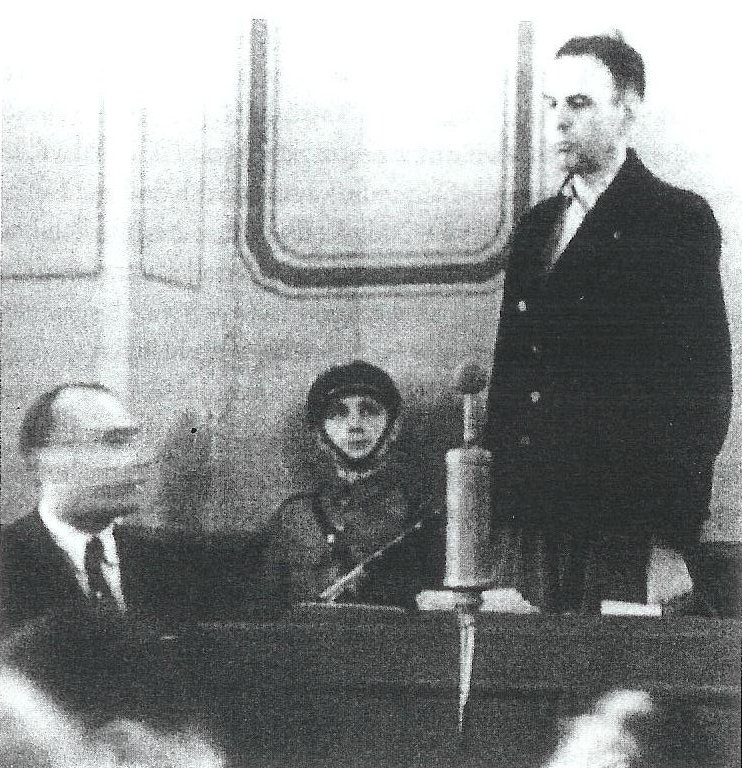
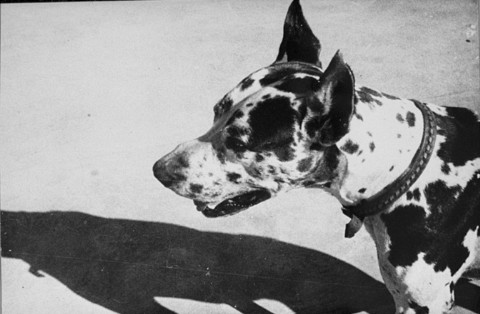
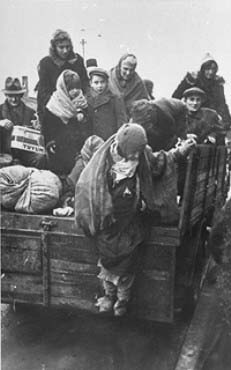

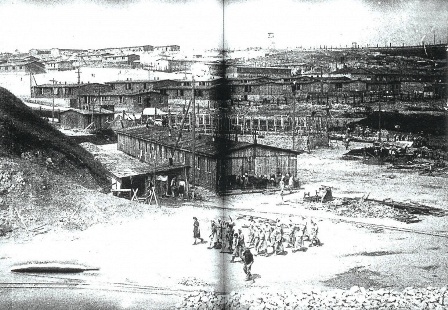
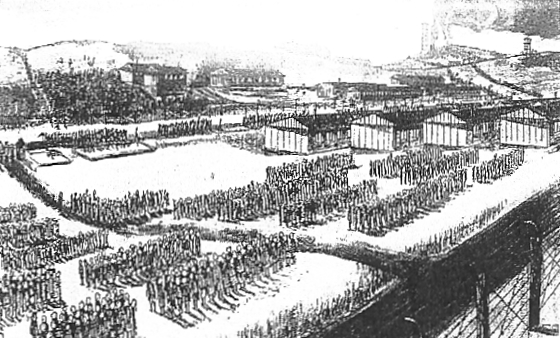
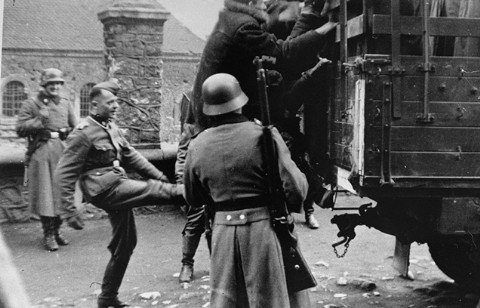
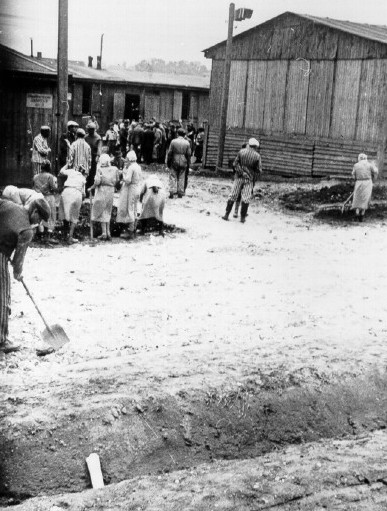

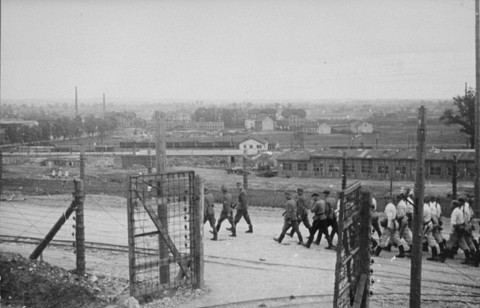
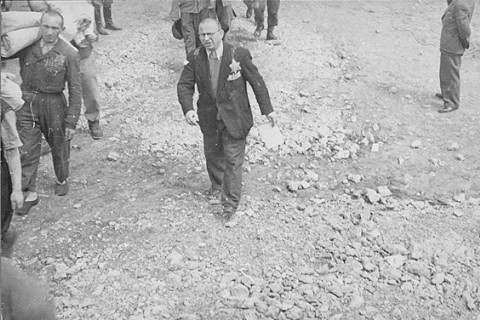

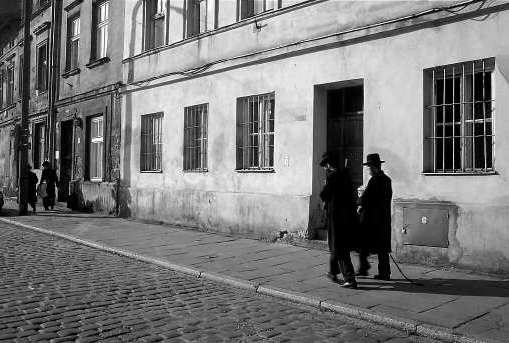


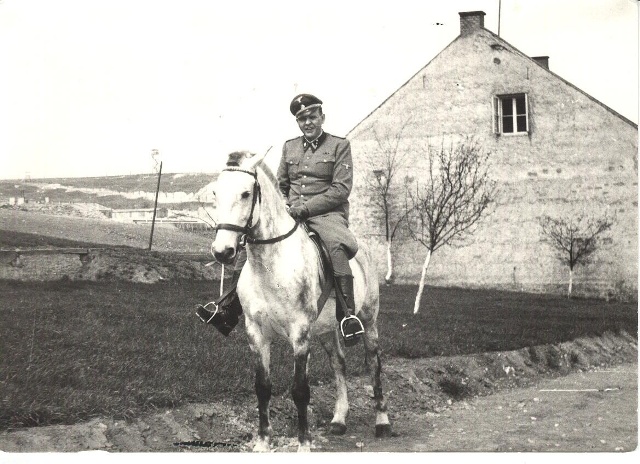
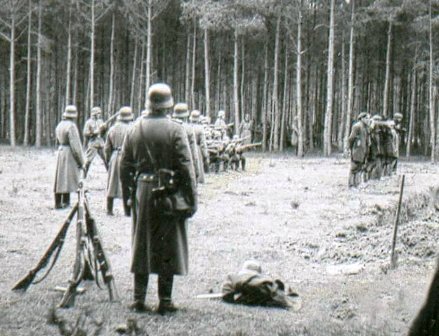
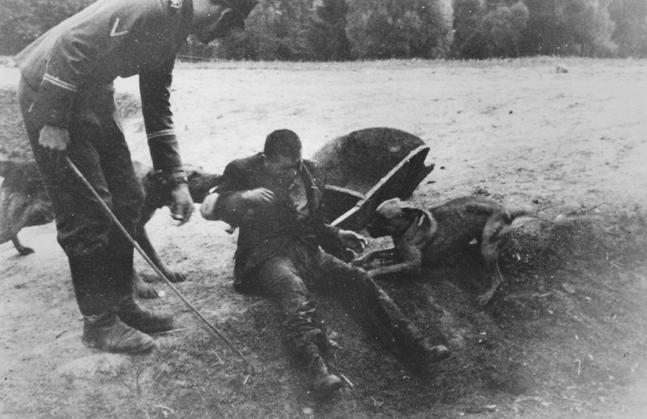
,%20commandant%20of%20the%20Plaszow%20camp.jpg)
